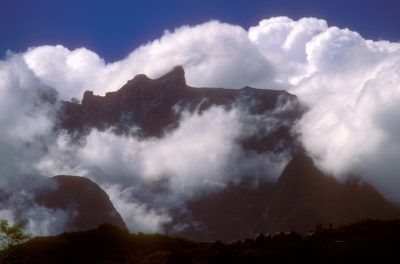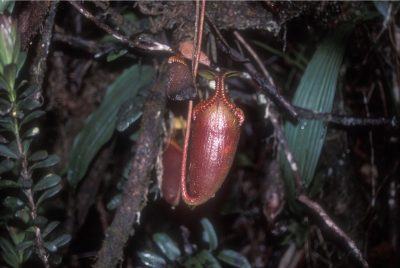by Bill Murray
A fine young man with a Yesus Kristus medallion bouncing around beneath his mirror drove us the seven or so kilometers into Mt. Kinabalu park, through the sleeping village of Kundasang. Farmers congregated at a warren of tin-roofed stalls along the main road. It looked like a good day for green tomatoes, potatoes, and cabbage.
 They hauled us all in bas minis from the ranger station to the trailhead. From there, a six-kilometer trail led up to our destination, the Laban Ratah guest house, at 11,000 feet. At 13,432 feet, Mt. Kinabalu’s summit, in Malaysian Borneo, is the highest point in Southeast Asia.
They hauled us all in bas minis from the ranger station to the trailhead. From there, a six-kilometer trail led up to our destination, the Laban Ratah guest house, at 11,000 feet. At 13,432 feet, Mt. Kinabalu’s summit, in Malaysian Borneo, is the highest point in Southeast Asia.
Just at first the trail led downhill, charming, to a cool, wet place called Carson’s Falls. On the way down the mountain, conversely, having to climb at the end was just one last kick in the butt on the way out the door.The first kilometer (the trail was marked at each 1/2 kilometer) popped by in 23 minutes. We were flyin’, and all that stuff about how hard this would be was just talk. The first kilometer, we only stopped long enough to shed our wraps.
Still before 8:00 a.m. no sunlight had fought its way to the forest floor. The air was downright chilly once our shirts turned sweaty. And they did — at the first K marker they weren’t soaked through, but a breeze blew down the rise and chilled our damp skin.
We were cocky, jaunty, making tracks, and unappreciative of the flora, except the little violet flower of the Kinabalu Balsam, which was shaped more like it had a beard than lower petals.
The massif stood silent and still, the only sounds birds or a rustling squirrel. There are no monkeys on Mt. Kinabalu. They live nearer the sea, to the east.
Our guide Erik was a volcano of phlegm at first, hacking, spitting, coughing, exercising all facial cavities. He was a little guy, as these highland people were, but with the strong, imposing legs you’d imagine.
He guided once a week, reckoned he’d done the climb fifty times. His personal record to the top — a place called Low’s Peak — was about three hours.
The rest of the week he helped his parents haul their produce to the Kundasang market, where you cain’t make no money. Erik said a kilo of cabbage brought fourteen U.S. cents.
•••••
Grim realization set in during kilometer two. I felt my pack with every step, even though all it held was a camera, a towel, a dry t-shirt, bread, cheese and water.
We appreciated the moss, ferns and banana trees and searched for these particular birds who sang in two notes, but a little more grimly, a little less buoyant, quieter. Still, we made two kilometers in 58 minutes, and there were only six, total. We fed the squirrels some of the tiny peanuts Mirja had bought. Still cool and still, the entire third kilometer. Dark, thick, jungly, even almost cold, and about an hour and a half after we’d set out, at two minutes to nine, we marked halfway.
•••••
In the fourth kilometer, blazing red running shorts caught my gaze. I looked up from the path and it was a Japanese fellow, smiling. He made the summit, turned, and passed us on his way back down before we’d made four and a half K. I just couldn’t believe that.
They do this run as competition. The winner last year, Ian Holmes of the U.K., did 21 K up to the peak and back in 2:43:20, trailed by fellow Brit Simon Booth at 2:43:22. Poor Simon Booth.
•••••
I thought of Beck Weathers on that famous ill-fated Everest expedition, who was left for dead, but stumbled, frostbitten, back to camp. He said mountain climbing, really, was simple. All you had to do was be in shape and then not let your mind defeat your body. One foot in front of the other, he said, it’s all just endurance.
But by now I was grim, unhappy, soaked-through wet. I used Weathers’ advice and eventually thought I’d achieved a sort of runner’s high. I had a little bounce back, but I was hiking sloppy — lurching, and, when there was something to grab on to, I hauled myself up by it. Still, I was sure for the first time since Carson’s Falls that we would make it. I turned cocky.
We stopped to enjoy Mirja’s chocolates and tiny peanuts, like they sell in Nuwara Eliya, back in Sri Lanka. We sat there steaming. Our own personal dew points produced our own, individual, self-generated clouds of steam, our shirts purely drenched through.
•••••
Porters made good money — six ringgits per kilo — but that work’s just too hard, Erik thought, and I was sure he was right. A typical load was ten to twelve kilos (twenty max) and that’d bring you twenty bucks — then you had to haul the trash back down from the top.
Erik liked guiding.
U.S. twenty was real money. The park required we have a guide and took a fee for him, so that Erik made about eight bucks for his day, probably as good as a porter if he got a right-tipping foreigner — and no taking out the trash.
The porters plied the path up and back, right alongside us, low to the ground and bent, exchanging local-language intelligence with Erik on the way, usually hauling rice bags full of supplies for the restaurant and guest houses up above, held by straps across their foreheads. Or sometimes they’d be laden with daypacks and duffels of tourists.
Twice we passed Japanese girls in flip-flops, and the last one was really hobbling, on her boyfriend’s arm. Mountain climbing may involve stepping over rocks. Apparently they were not told.
•••••
Erik commanded pretty good English.
Had he ever been to K. L. (Kuala Lumpur, the capital)? I asked.
“No, but when I get money I take my baby.”
It’s a big city, you know, tallest building in the world (at the time)….
“Oh, no!” Scornful reply. He was aiming high. “Maybe one day I get 10,000 ringgits I go around the world!”
•••••
I spent long minutes anticipating the sun, by which to energize. We were still deep within the forest at the two- hour mark, and again I had begun to flag. It was damp, I was wet, and the path stretched only straight up.
Twenty or thirty meters of steep steps would lead to a bend, and you’d yearn for a stretch that didn’t lead straight up, but time after time after time after time after time, you’d reach the bend and see even crueler steps beyond. And then you’d do it again. And then again.
•••••
At first the sun would hit the forest floor in this odd spot or that, then as we rose (so slowly) up the hill you’d see sun more often than not, and by 10:00 in the morning we stood at the Layang Layang staff hut, on a little plateau flooded by sunlight. I drenched my head under a water pipe.
Up to now there were few on the mountain with us except the runner and a couple of porters. Now groups of overnight campers passed us bound for the bottom, but no one but Malay boys climbed (in fact, we were the first to set out, and first to arrive at Laban Rata).
Eric was constant. Mirja and I waxed and waned at intervals, and kept one another going. At the four K mark, I hit my stride one last time. It was 10:08, only two K to go. I fairly strode ahead. The sun was out now, but we’d ever be ducking into a crook in the trail that led through shaded forest.
 Here was a sign, “NEPENTHES VILLOSA areas 9000-10,300 ft.” by which they meant those curious pitcher plants were about, and we spied several in the woods, the biggest the size of two fists.
Here was a sign, “NEPENTHES VILLOSA areas 9000-10,300 ft.” by which they meant those curious pitcher plants were about, and we spied several in the woods, the biggest the size of two fists.
The curious pitcher plant.
A big Chinese contingent slid downward, all chatty. Along about here my recently found vigor ran out and I resented their being able to breathe. Like Mirja said, on the way up it’s your heart and lungs, on the way down it’s your legs, and I began to get an ugly payback for my cocky “hitting my stride” bit, as I could hear my heart pounding in my head.
We stopped (it was an excuse to stop) to watch a green bird, the “Mt. Kinabalu Blackeye.”
•••••
Now this was terrible. Stretching above us we had to begin some scrambling. It was just damned hard. Mud. I saw myself closed off now, thinking only of where my next foot would go (except I had this vague “What the hell were you thinking!?” notion bouncing around my head, too).
I seized upon a mantra. I said to myself, over and over, “Mt. Kinabalu blackeye.” Over and over. Now, whenever we’d spy anyone above us on the trail, we’d (“graciously”) stop to let them slide by.
One fifty-something Japanese fellow laughed at himself how he’d taken eight and a half hours to the summit. Hell, we weren’t even going to the summit and we weren’t laughing. Yeah, but anybody can laugh and climb down, I thought.
Now came a section where you had to haul yourself up by rope. Now the trees were small, dwarfed and gnarled by the wind, cold and thin air. They were small, but Erik said some were hundreds of years old.
At 10:58 we stood on the five K marker. Someone coming down asked if this was our first time and Mirja peremptorily replied, “And the last.”
We could see the South China Sea from here, 52 kilometers to the north. And our hotel, the Perkassa, high on its hill overlooking Kundasang town, was an insignificant little speck below. We stopped every third or fourth step for the last kilometer, which took 50 minutes.
At 11:48 we reached the top.
Which wasn’t the top. The Laban Rata guesthouse was built 15 years ago to support summit seekers. At 11,000 feet, it has 20 tables, bunks and a grocery with Milo, old batteries, candy bars, Carlsbergs and a kitchen serving up fried rice, sweet corn soup and coffee. The bulletin board admonished, though, that today we had no: cream of chicken soup, Maggi chicken, chicken, lemon or chicken curry. Cursed porters.
So we had lunch – fried rice – and climbed down. Four hours twenty minutes up, 3:10 down. On the way to the bottom we passed a mere boy carrying a 40 kg coil of rope. Impossible. Weak as I was by now, I couldn’t even lift it, but he hoisted it through two loops onto his back and it would take a day and a half to haul it up there — for 63 dollars in ringgits.
We were both thoroughly hobbled by the last two K down, Mirja and me, our brakes having given out, both of us gripping the handrails when there were any, noticing all too clearly that Eric just ambled on down the hill ahead of us the way he had ambled up. We went home, ate a table full of daging redang and papadums with a side of fiery red chopped chillies, and slept hard by eight o’clock.
•••••
